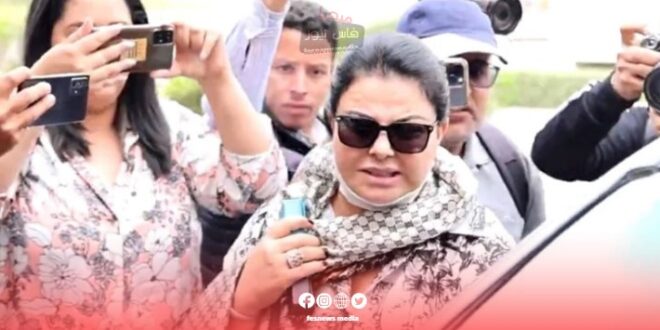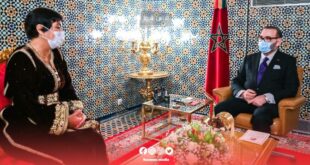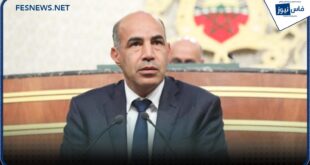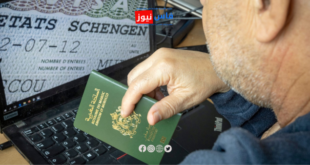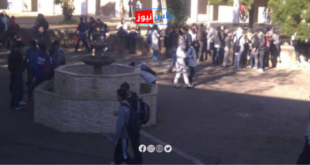The famous Moroccan artist Latifa Raafat appeared yesterday, Monday, before the investigative judge at the Casablanca Court of Appeal, following the complaint she filed against the mercenary Idriss Farhan and a group of people in Morocco and abroad, following the leak of audio recordings related to the Sahara Escobar case and attributed to her.
This aphorism, attributed to former French Interior Minister Charles Pasqua, summarises the evolution of the Sahara Escobar case, which has seen the opening of files as the judicial investigation progresses and grows like a fungus.
After the prosecution of the utopian Reda Toujni, who was sentenced to four years in prison as part of a sub-case following a complaint filed by Justice Minister Abdellatif Wehbi, another sub-case was opened: the case of the audio recordings of Taifa Raafat, the former wife of drug lord Hajj Ahmed.
The ex-wife of drug baron El Hadj Ahmed Ben Brahim, known as ‘El Mali’ – the man whose confessions to the National Office for Judicial Research (ONRJ) in a case of the same name – for just over four months in 2013 (six years before he was arrested in 2019 and sentenced to 10 years in prison), the Moroccan songstress recently found herself in the spotlight after the broadcast of spastic recordings of mercenary Idriss Farhane.
The founder of Chourouknews24, who was arrested at the end of April in Brescia, Italy, blackmailed the ex-wife of Al Mali ‘for sums amounting to millions of dirhams’, according to her lawyer Abdelfattah Zahrache.
Mr Zahrache, who accompanied Latifa Raafat to her appearance before the investigative judge on Monday afternoon, told the press that this appearance ‘has nothing to do with the first case (the Escobar of the Sahara case)’ and that the singer came to plead as a civil party.
‘In the first case, she was heard as a witness. So they tried to blackmail her, but she didn’t give in to blackmail.’
‘We hope that his appearance before the Moroccan judiciary will be expedited, because he knows a lot of things and has the names of several people involved in this case who wanted to harm Ms Latifa Raafat and several other people named in the investigation,’ he added.
The same lawyer added that the file on the above-mentioned defendant was sent to the National Judicial Police Squad on the instructions of the Attorney General. It turned out that the accused, ‘who was arrested on the basis of an international arrest warrant, had a network that he used in this case.’
‘Idriss Farhane presented himself as an officer in the security services, but he is only a trap officer,’ Mr Zahrache told the press, quoting a defendant ‘currently in detention and part of this network,’ calling for the arrest of ‘the rest of the people involved in this case.’
The main witness in the Escobar Desert case, Latifa Raafat, who was the wife of El Hadj Ben Brahim when he was involved in criminal activities, confirmed during the judicial investigation the existence of links between El Hadj Ben Brahim and former Wydad president Said Nasseri.
The two men often exchanged large sums of money at the singer’s villa in Rabat. Raafat alleged in police reports that her ex-husband had financed Nasseri’s electoral campaign in Zagora.
While public opinion was eagerly awaiting the start of the trial involving at least 25 people, including Casablanca Regional Council President Said Nasseri and Eastern Region President Abdelnabi Biaoui, after the judicial investigation was completed, it had to wait even longer after the deputy public prosecutor filed an appeal with the Casablanca Court of Appeal for the offence of currency trafficking by officials.
The chamber granted the request and ruled that the prosecution would continue. A few weeks earlier, it had also ruled to uphold the charge of ‘exporting narcotic drugs and psychotropic substances without a licence or authorisation’. Thus, the initiation of this new ‘case within a case’ would further delay the closure of the investigation phase.
From the website: Fez News
 فاس نيوز ميديا جريدة الكترونية جهوية تعنى بشؤون و أخبار جهة فاس مكناس – متجددة على مدار الساعة
فاس نيوز ميديا جريدة الكترونية جهوية تعنى بشؤون و أخبار جهة فاس مكناس – متجددة على مدار الساعة

